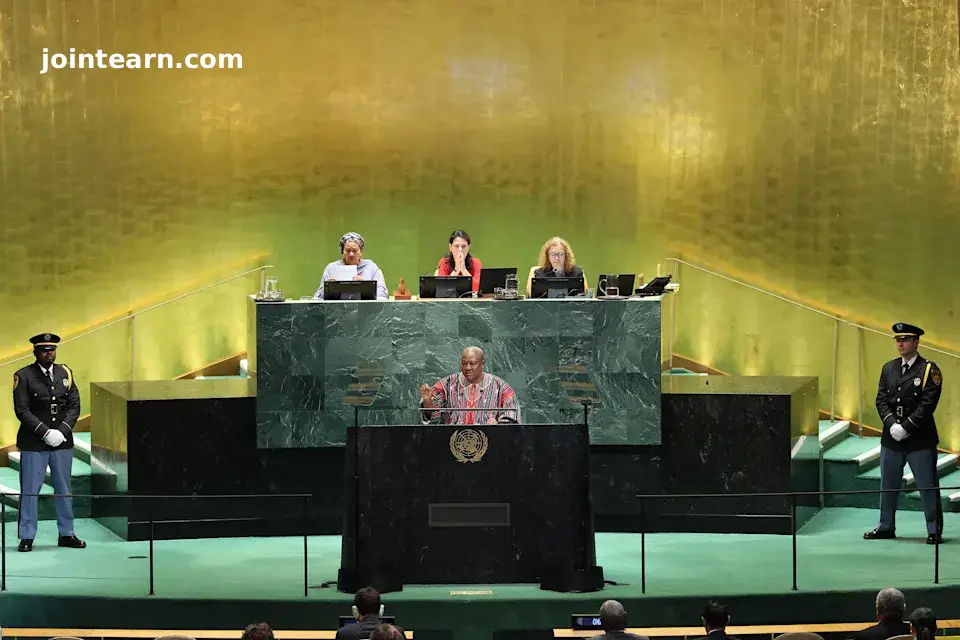
A New Vision for African Independence
Ghana’s President John Dramani Mahama is redefining what it means for Africa to stand on its own. His assertive diplomacy, outspoken criticism of Western dependency, and commitment to economic reform signal a new era for a continent seeking self-determination.
Sitting inside the sleek halls of Jubilee House in Accra, Mahama exudes calm conviction. “They asked my Foreign Minister, ‘Can you tell your President to stop writing?’” he laughs, referencing a fiery op-ed that challenged U.S. President Donald Trump’s remarks about South Africa. “Well, I am a writer — and I will keep expressing myself.”
Mahama’s voice has become emblematic of a changing Africa — one that refuses to be a passive recipient of aid and instead seeks sovereignty through innovation, trade, and resource management.
“The Future Is African”: A Bold Declaration at the U.N.
In September 2025, Mahama took the stage at the United Nations General Assembly and accused the U.N. Security Council of “almost totalitarian guardianship over the rest of the world.” His demand: the inclusion of an African member and the abolition of veto power. “The future is African,” he declared to standing applause.
This isn’t mere rhetoric. By 2050, one in four people on Earth will be African, and the continent’s GDP is expected to soar from $2.6 trillion in 2020 to $29 trillion. Yet Mahama understands that population growth and potential alone won’t secure Africa’s future — structural transformation and autonomy will.
Ghana’s Economic Reset: A Blueprint for Self-Reliance
When Mahama returned to power in January 2025, Ghana’s economy was reeling — high debt, 38% youth unemployment, and a weakened cedi. Within six months, his government halved inflation, stabilized the currency by 30%, and launched a bold initiative: “Resetting Ghana.”
Key reforms include:
- A 24-hour economy encouraging round-the-clock business operations.
- Tax cuts on online purchases and betting to stimulate digital entrepreneurship.
- Free tertiary education fees for first-year students.
- Free feminine hygiene products for schoolgirls.
- A code of conduct to root out government corruption.
- Plans to train one million software developers to drive Ghana’s emerging tech industry.
“We know our responsibilities,” Mahama says. “We must make Ghana safe, innovative, and self-sufficient.”
The End of Aid Dependency: Opportunity in Adversity
Shortly after his inauguration, Mahama faced an unexpected challenge: the Trump administration’s sweeping cuts to USAID, which once allocated $12.7 billion to sub-Saharan Africa. Ghana lost $156 million earmarked for HIV prevention, malaria control, and education.
While many nations faltered, Mahama’s government swiftly reallocated domestic funds. “We covered it with our budget,” he explains. “We’re fine — but others are not.”
His message: aid dependency is not a sustainable model. The cuts, while painful, became a wake-up call for African nations to take charge of their destinies.
Rethinking Africa’s Place in the Global Order
The cuts and tariffs from Washington have reshaped global alliances. Mahama views these moves as part of a broader trend toward unilateralism, which he says undermines cooperation. “Collaboration would have been better than the current global tensions,” he notes.
With the U.S. retrenching, China, the Gulf States, and India are intensifying engagement in Africa. Even the U.K.’s Sadiq Khan led a trade mission to Ghana, signaling renewed Western interest. Yet Mahama remains wary of becoming dependent on any single global power. “I don’t like to focus on just China,” he says. “We must engage everyone on our terms.”
The Case Against Foreign Aid
Critics of traditional aid, including Zambian economist Dambisa Moyo, argue that foreign assistance breeds complacency among African policymakers. Studies show that aid often bypasses local systems, with less than 10% of USAID funds ever reaching African institutions.
“Aid engenders laziness,” writes Moyo. “It creates governments accountable to donors, not citizens.”
Mahama’s leadership, however, demonstrates a shift from aid dependency to self-reliance, emphasizing fiscal discipline, industrialization, and homegrown solutions.
Ghana’s Economic Revival: Gold, Tech, and Green Growth
Under Mahama, Ghana is leveraging its natural resources more strategically. His government established GoldBod, a regulatory authority combating illegal mining and ensuring gold revenue stays in Ghana. Gold exports have surged 75% year-on-year since the reforms.
Ghana’s first commercial gold refinery opened in 2024, part of Mahama’s plan to move beyond raw exports toward local processing and manufacturing. “We must process what we produce,” he asserts.
He’s also looking to the carbon credit market as a new frontier. With 60% of Africa’s arable land and vast forests, Ghana can monetize carbon sequestration while restoring degraded lands. “We’ve liberated nine forest reserves from illegal miners,” Mahama reveals. “We are reclaiming them for the future.”
Africa’s Technological Transformation
Mahama’s ambition extends beyond resources. He envisions Ghana as a digital and innovation hub, training coders and supporting fintech startups. The Google AI Community Center in Accra and a $37 million U.S. research grant are early signs of progress.
“We’re looking at digital services, manufacturing, and agribusiness,” Mahama says. “Africa must not only export commodities — we must export knowledge.”
Intra-African Trade: The Path to Prosperity
Through the African Continental Free Trade Area (AfCFTA), Mahama sees a $3 trillion opportunity to expand Ghana’s markets beyond its 34 million citizens to 1.3 billion consumers.
He emphasizes collaboration with India, which recently pledged technology partnerships to boost Ghana’s pharmaceutical production. “We can trade with each other and grow together,” Mahama insists.
A New African Identity: From Aid to Agency
While Ghana’s path to full self-reliance remains challenging, Mahama’s leadership captures a continental awakening. African nations are asserting economic sovereignty, renegotiating trade deals, and investing in value-added industries.
As Mahama told TIME, “Since World War II, the world has progressed through cooperation. Now unilateralism is taking hold. But the world moves forward together — not apart.”
Ghana’s story, under his guidance, could serve as a blueprint for Africa’s economic independence — one where innovation, trade, and resilience define a new African century.


Leave a Reply